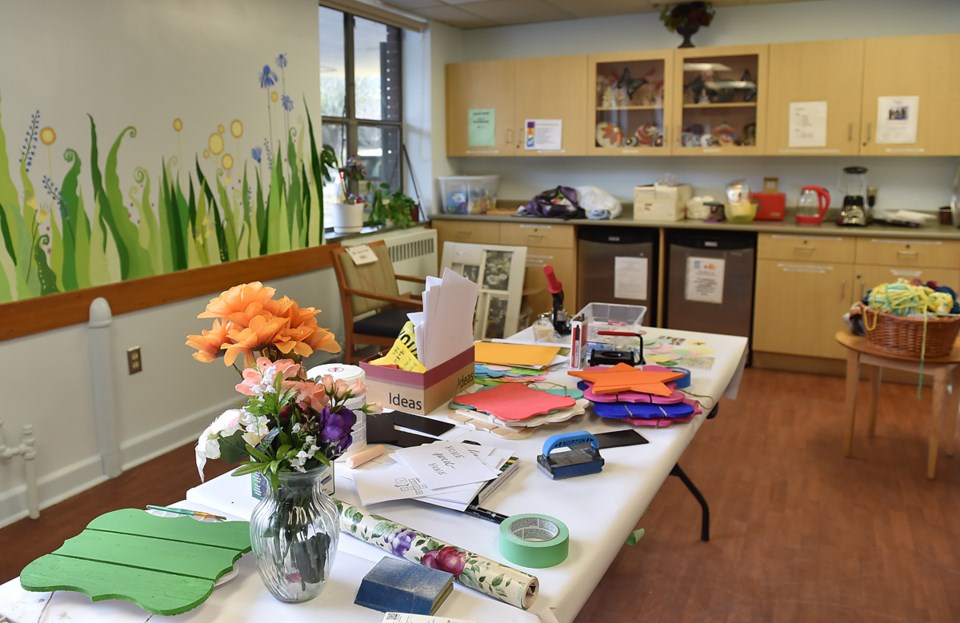Imagine a loved one living with dementia, but who is still able to safely walk out their front door, shop at the grocery store and even drop into a pub for a drink without anyone to guide them.
That’s the model Providence Health Care is introducing by way of what’s known as a dementia village or “household innovation project,” which will eventually be surrounded by a secure perimeter so residents can go about their daily lives with liberty and dignity, but also safely.
Jo-Ann Tait, Providence corporate director of seniors care and palliative services, said to get the trial started as soon as possible, the north wing of the Holy Family Residence care home on Argyle Street was transformed into a type of dementia village.
In January, Providence created two households of 12 residents each in its north wing to simulate dementia village households where residents share a common bond. The majority of residents now have private rooms allowing for more personal and individualized space. Providence also increased the number of resident care aid staff available in the evening.

“In these households the residents can get up and leave out the front door because they’re confined by the outer extremities,” said Tait. “The household holds 12 people who share their own kitchen and social space and 12 private bedrooms.”
Tait said the project was made possible by a $3.3-million donation to Holy Family Residence from Beatris and Peter Jurazs to adapt the existing care home to infrastructure and programs based on the principles of the De Hogeweyk dementia village model in the Netherlands. The goal is to eventually transfer the model to stand-alone dementia villages. As part of research for the project, Tait visited Europe with a group of professionals to see De Hogeweyk dementia villages for themselves. Tait said the residents they met with were able to visit a café, go grocery shopping and enjoy the music room on their own.
“We went to 19 different places in five countries in two weeks,” said Tait. “In one place in the Netherlands it was 10 a.m. and a bunch of residents had congregated in a pub and were drinking beer and having a sing-along. People were living with such vibrancy.”
Tait said based on the research gathered, Providence decided not to wait until it could build a stand-alone dementia village, but instead began introducing elements of the project into existing residences, including the creation of smaller dining rooms in the households to encourage a more intimate and communal mealtime experience. As well, beds have been designed and prototyped with motion sensor lights under them, which illuminate the way to the bathroom so that residents who get up in the middle of the night don’t have to search for a switch. The next step is building a secure perimeter around Holy Family Residence with creative fencing and landscaping, which will give residents access to the outdoors. Tait said with a secure perimeter, the need for chemical restraints is often diminished.
The themes of the two households at Holy Family include “Gastown” and “Hollywood” with a goal to make the residences feel more like a home than a work space. To that end, offices have been moved out of sight and nursing stations removed from the north wing. As well, institutional-style signs are no longer in use.
“The north wing of Holy Family Residence will no longer be a workplace where people live, but a home where people happen to work. People who currently live at Holy Family are excited about this as well as their family members,” added Tait.
Tait noted the Jurazs were a husband and wife who lived within humble means in order to make this substantial gift and no one is exactly sure what their connection to Holy Family is. Tait added with future donations made to the St. Paul’s Foundation, dementia care services and dementia villages are also planned for St. Joseph’s in Comox and Heather Street in Vancouver. To help support this program, as well as all seniors care at Providence, visit helpstpauls.com. According to Alzheimer Society of Canada, in 15 years, the number of Canadians living with dementia is expected to nearly double.
@sthomas10



